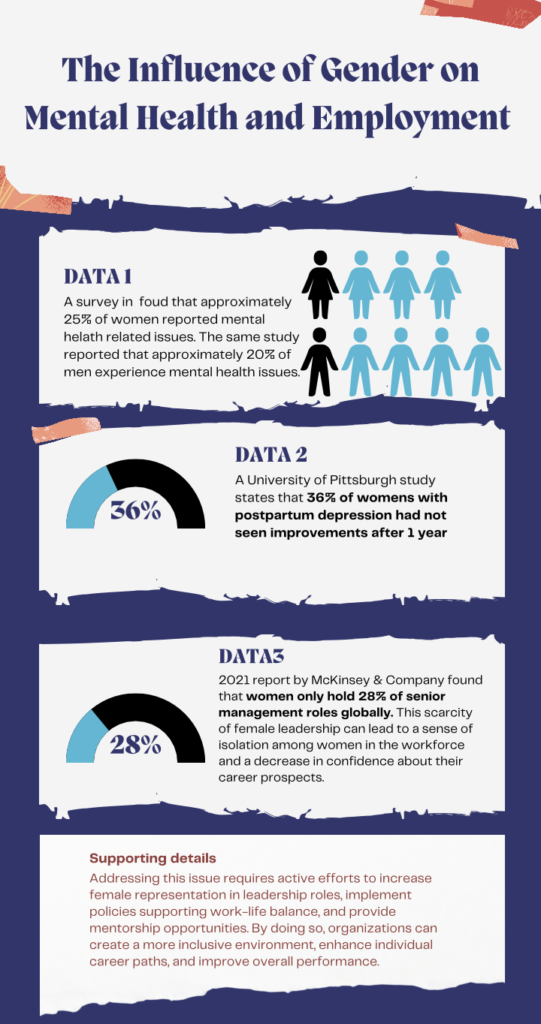By: Anthony DiFederico and Luke Lentine
Summary of findings:
In the United States, nearly 20% of the population, or roughly 50 million people suffer from mental illness. While both men and women experience mental health issues, the long lasting impacts on employment due to mental health are marginally different. A study reported that approximately 20% of men and approximately 25% of women suffer from mental health related illness. Some of the major symptoms of mental health are anxiety and depression and trying to balance work with a busy home schedule can be challenging for all, especially mothers. In the journey of motherhood, the postpartum period is a unique chapter, often marked by emotional rollercoasters. This phase can bring about various mental health challenges for new mothers, such as feelings of anxiety, depression, and overwhelming stress. These symptoms can be influenced by several factors, including the balance between work and caring for the new baby, as well as the level of social support available. A University of Pitt study found that 36% of new mothers’ depression did not subside 1 year postpartum. For these uncontrollable reasons, women are seen as less desirable when compared to the male counterparts not only within the hiring process, but in their ability to earn high ranking jobs in the workplace as a whole. This increased depression and anxiety causes not only a decrease in the health of the woman, but in the entirety of the family. A study showed that the underemployment of women, directly related to their mental health caused low birth weight of their child, with their children being qualified as low weight when being under 2500 grams. The implications of women’s poor mental health created by the workplace leads to more care being needed for their child, which therefore will lead to more stress and depression on the mother as the caring of the child as we know is in their hands and the child will be in more need of support with these challenges related to birth weight.

Policy Recommendations:
Considering the statistics from our findings, it is clear that policy intervention regarding women’s mental health in the workplace is essential. Flexible work environments such as remote options, and adaptable working hours can be particularly beneficial to the success of parents with young children in the workplace. Additionally providing financial benefits such as covering the cost of childcare services will lessen the burden that caring for children has on new parents both financially and mentally. Additionally, mental health check ups as well as counseling within the office should become a common practice that will not only make the environment more enjoyable for all, but increase productivity of workers.
Consequences without Intervention:
Due to these findings, women are often overlooked for high ranking positions in the workplace, or not given the opportunity at all through the discrimination in the hiring process. While these symptoms are part of their natural biology and come with balancing their work with their jobs at home, to which they often do more than men, they still end up paying the price in the long run. Additionally, the term “emotional” is very common when describing women in the workplace. This can be very harmful to women’s confidence as according to a study by McKinsey and Company found that only 28% of senior management roles are held by women. The combination of not seeing themselves in positions of high rank and the adjectives used to describe them is detrimental to a woman’s success in the workplace, and will lead to a domino effect lasting generations.
Research Questions:
- What is the impact of various employment statuses (full-time, part-time, unemployed) on the mental health of parents?
- How do men and women differ in their responses to the mental health challenges of balancing work and family life?
- How does the postpartum stress of stay at home mothers differ from full time and part time workers who are mothers?
- What are the long-term mental health effects for parents who juggle full-time employment?
- How do cultural perspectives on employment and gender roles influence the mental health of married individuals?
References:
Dooley, D., & Prause, J. (2005). Birth weight and mothers’ adverse employment change. Journal of Health and Social Behavior, 46(2), 141–155. https://doi.org/10.1177/002214650504600202
Gove, W. R., & Geerken, M. R. (1977a). The effect of children and employment on the mental health of married men and women. Social Forces, 56(1), 66. https://doi.org/10.2307/2577413
Decken, C., Knitza, J., Witte, T., Fekete, S. P., Konitzny, M., Zink, A., Gauler, G., Wurth, P., Aries, P., Karberg, K., Kuhn, C., Schuch, F., Späthling-Mestekemper, S., Vorbrüggen, W., Englbrecht, M., Welcker, M., & RHADAR Group. (2021). A real-world rheumatology registry and research consortium: The german rheumadatenrheport (RHADAR) registry. Journal of Medical Internet Research, 23(5), e28164. https://doi.org/10.2196/28164
Ross, Catherine E., and John Mirowsky. “Does Employment Affect Health?” Journal of Health and Social Behavior, vol. 36, no. 3, 1995, pp. 230–43. JSTOR, https://doi.org/10.2307/2137340. Accessed 30 Nov. 2023.